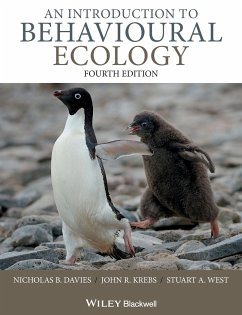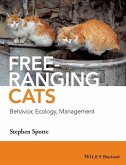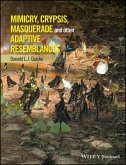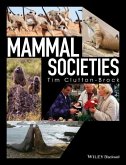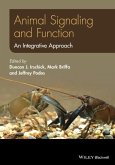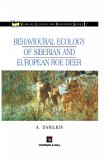Additional resources for this book can be found at: www.wiley.com/go/davies/behaviouralecology
This textbook helped to define the field of Behavioural Ecology.In this fourth edition the text has been completely revised, withnew chapters and many new illustrations and full colourphotographs. The theme, once again, is the influence of naturalselection on behaviour - an animal s struggle to survive andreproduce by exploiting and competing for resources, avoidingpredators, selecting mates and caring for offspring, - andhow animal societies reflect both cooperation and conflict amongindividuals.
Stuart A. West has joined as a co-author bringing his ownperspectives and work on microbial systems into the book. Written in the same engaging and lucid style as the previouseditions, the authors explain the latest theoretical ideas usingexamples from micro-organisms, invertebrates and vertebrates. Thereare boxed sections for some topics and marginal notes help guidethe reader. The book is essential reading for students ofbehavioural ecology, animal behaviour and evolutionarybiology. Key Features:
Long-awaited new edition of a field-defining textbook
New chapters, illustrations and colour photographs
New co-author
Focuses on the influence of natural selection on behavior, andhow animal societies reflect both cooperation and conflict amongindividuals
"The long-awaited update to a classic in this field is nowhere, presenting new direc-tions in thinking and addressingburning questions. Richly informed by progress in many otherdisciplines, such as sensory physiology, genetics and evolutionarytheory, it marks the emergence of behav-ioural ecology as afully fledged discipline..... This is a marvellous book,written in a lucid style. A must-read for those in the field, it isalso a cornucopia of new thinking for anyone interested inevolution and behaviour."
Manfred Milinski, Nature, 2012
This textbook helped to define the field of Behavioural Ecology.In this fourth edition the text has been completely revised, withnew chapters and many new illustrations and full colourphotographs. The theme, once again, is the influence of naturalselection on behaviour - an animal s struggle to survive andreproduce by exploiting and competing for resources, avoidingpredators, selecting mates and caring for offspring, - andhow animal societies reflect both cooperation and conflict amongindividuals.
Stuart A. West has joined as a co-author bringing his ownperspectives and work on microbial systems into the book. Written in the same engaging and lucid style as the previouseditions, the authors explain the latest theoretical ideas usingexamples from micro-organisms, invertebrates and vertebrates. Thereare boxed sections for some topics and marginal notes help guidethe reader. The book is essential reading for students ofbehavioural ecology, animal behaviour and evolutionarybiology. Key Features:
Long-awaited new edition of a field-defining textbook
New chapters, illustrations and colour photographs
New co-author
Focuses on the influence of natural selection on behavior, andhow animal societies reflect both cooperation and conflict amongindividuals
"The long-awaited update to a classic in this field is nowhere, presenting new direc-tions in thinking and addressingburning questions. Richly informed by progress in many otherdisciplines, such as sensory physiology, genetics and evolutionarytheory, it marks the emergence of behav-ioural ecology as afully fledged discipline..... This is a marvellous book,written in a lucid style. A must-read for those in the field, it isalso a cornucopia of new thinking for anyone interested inevolution and behaviour."
Manfred Milinski, Nature, 2012
"... a new edition of the textbook that has introduced generations of undergraduates (and postgraduates) to the delights of behavioural ecology, inspiring many (myself included) to take up the discipline professionally, is a rare treat. Behavioural ecology is, fundamentally, modern-day natural history and there is no clearer written, more inspiringly enthusiastic guide to the subject on the market. This book sets the gold standard for behavioural ecology and animal behaviour textbooks which will no doubt continue to inform and delight students and researchers in equal measure for many years to come." (Animal Behaviour, 1 March 2013)
"Overall, this seems a timely update to a very useful book; it should be widely used by lecturers and undergraduates alike." (British Ecological Society Bulletin, 1 December 2012)
"[An Introduction to Behavioural Ecology, 4th Edition] Stands tall as the textbook to have in the field of Behavioral Ecology...I expect anyone with an A level in Biology, or equivalent, or an interest in Zoology without the qualification, could pick this book up and get a lot out of it...What this book is, is good science explained well, I scored higher in my behavioral ecology exam than I did in any other exam in my finals. I wouldn't put that entirely down to this book, but it certainly influenced things.
The book is well printed, as you would expect, with great clear photographs used liberally, and a lot of graphs and diagrams.
In summary then, if you want to know why animals behave the way they do, why swordtail fish do really have the long tails, why birds sing, why fish shoal under certain circumstances, why well fed parrot females produce more males, and why related long-tailed tits help each other raise young, then this book really is for you. I recommend it wholeheartedly." (The Amateur Naturalist magazine, 1 November 2012)
"The book opens with a section on Watching and Wondering, capturing the excitement of natural history, that same wonderment that Kruuk describes so well, and then guides the reader through a series of fascinating questions and findings, experiments and field studies. . . This is clearly good for students wishing to put together presentations for assessments, and extremely useful for lecturers, new and old . . I should say that this is a certainty and future generations will owe this book a considerable debt." (Journal of Evolutionary Psychology, 1 October 2012)
"Among the most influential books in the field of behavioral ecology, An Introduction to Behavioural Ecology certainly stands out to the extent that it has been called 'a classic textbook." (Trends in Ecology & Evolution, 2012)
"The long-awaited update to a classic in this field is now here, presenting new directions in thinking and addressing burning questions. Richly informed by progress in many other disciplines, such as sensory physiology, genetics and evolutionary theory, it marks the emergence of behavioural ecology as a fully fledged discipline..... This is a marvellous book, written in a lucid style. A must-read for those in the field, it is also a cornucopia of new thinking for anyone interested in evolution and behaviour." (Manfred Milinski, Nature, 2012)
"Overall, this seems a timely update to a very useful book; it should be widely used by lecturers and undergraduates alike." (British Ecological Society Bulletin, 1 December 2012)
"[An Introduction to Behavioural Ecology, 4th Edition] Stands tall as the textbook to have in the field of Behavioral Ecology...I expect anyone with an A level in Biology, or equivalent, or an interest in Zoology without the qualification, could pick this book up and get a lot out of it...What this book is, is good science explained well, I scored higher in my behavioral ecology exam than I did in any other exam in my finals. I wouldn't put that entirely down to this book, but it certainly influenced things.
The book is well printed, as you would expect, with great clear photographs used liberally, and a lot of graphs and diagrams.
In summary then, if you want to know why animals behave the way they do, why swordtail fish do really have the long tails, why birds sing, why fish shoal under certain circumstances, why well fed parrot females produce more males, and why related long-tailed tits help each other raise young, then this book really is for you. I recommend it wholeheartedly." (The Amateur Naturalist magazine, 1 November 2012)
"The book opens with a section on Watching and Wondering, capturing the excitement of natural history, that same wonderment that Kruuk describes so well, and then guides the reader through a series of fascinating questions and findings, experiments and field studies. . . This is clearly good for students wishing to put together presentations for assessments, and extremely useful for lecturers, new and old . . I should say that this is a certainty and future generations will owe this book a considerable debt." (Journal of Evolutionary Psychology, 1 October 2012)
"Among the most influential books in the field of behavioral ecology, An Introduction to Behavioural Ecology certainly stands out to the extent that it has been called 'a classic textbook." (Trends in Ecology & Evolution, 2012)
"The long-awaited update to a classic in this field is now here, presenting new directions in thinking and addressing burning questions. Richly informed by progress in many other disciplines, such as sensory physiology, genetics and evolutionary theory, it marks the emergence of behavioural ecology as a fully fledged discipline..... This is a marvellous book, written in a lucid style. A must-read for those in the field, it is also a cornucopia of new thinking for anyone interested in evolution and behaviour." (Manfred Milinski, Nature, 2012)

